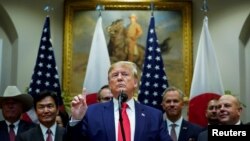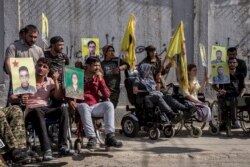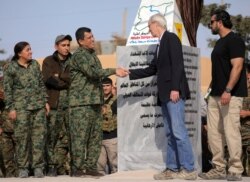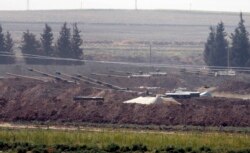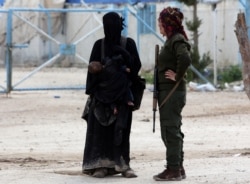(Carla Babb at the Pentagon and Nike Ching contributed to this article.)
WASHINGTON — U.S. President Donald Trump insisted Tuesday that he is not abandoning Kurdish forces in Syria, despite his orders to withdraw U.S. special forces from the Syrian-Turkish border region to make way for a Turkish incursion.
"We may be in the process of leaving Syria, but in no way have we Abandoned the Kurds, who are special people and wonderful fighters," Trump tweeted.
"Any unforced or unnecessary fighting by Turkey will be devastating to their economy and to their very fragile currency,' he added. "We are helping the Kurds financially/weapons!"
But in a separate set of tweets Tuesday, the president also praised Turkey, inviting Turkish President Recep Tayyip Erdogan to visit the White House next month (November 13), while calling Ankara a "big trading partner" and crediting the Turkish government with "helping me to save many lives at Idlib Province."
The assurances, seemingly aimed at soothing Turkey, a NATO ally, and the Kurds, a key ally in the fight against the Islamic State terror group, comes days after the White House surprised many in Washington and around the world by suddenly announcing it had ordered the withdrawal of about 50 U.S. special forces in the area along the Syrian-Turkish border, clearing the way for Turkey to proceed with its long-planned offensive.
Backlash from lawmakers
The decision prompted an immediate backlash from U.S. lawmakers, including many who have been staunch defenders of the president.
Some slammed the decision as a betrayal of the Syrian Kurds, viewed by many in Washington as the most dependable ally in the fight to destroy the IS caliphate. Other lawmakers warned the decision would only benefit Russia, Iran and Syrian President Bashar al-Assad, as well as allow IS to regain momentum.
"We are humbled by the enormous support by American people and politicians despite @POTUS decision to pave the way for Turkish invasion," Syrian Democratic Force spokesman Mustafa Bali tweeted Tuesday. "American people are true friends of the SDF."
But Bali also challenged Trump to see the situation on the ground for himself.
"We invite @POTUS to come see the progress #SDF & #US made in NE #Syria," he said. "You are welcome!"
"We have more work to do to keep #ISIS from coming back & make our accomplishments permanent. If #America leaves, all will be erased," he added, using an acronym for the terror group.
With the U.S.-backed SDF spearheading ground operations, the U.S.-led international coalition liberated the last remnant of IS' self-declared caliphate this past March.
Since then, the United States has continued to provide support to the mainly-Kurdish SDF, as they engage in additional clearing operations against IS remnants and sleeper cells across northeastern Syria.
Some SDF officials confirmed Tuesday that despite the withdrawal of U.S. special forces from the along the Syrian border with Turkey, they have continued to receive U.S. provisions for their anti-IS mission.
But other SDF officials have signaled they are willing to look elsewhere for help.
SDF Commander General Mazloum Kobani told NBC News he has been forced to consider partnering with forces loyal to Syrian President Bashar al-Assad to fend off the expected Turkish invasion.
"This is one of the options that we have on the table," he said.
Turkey's military, meanwhile, announced Tuesday that, "All preparations for the operation have been completed."
"The TSK will never tolerate the establishment of a terror corridor on our borders," it said via Twitter.
Turkey views the People's Protection Units (YPG), the main force within the SDF, as an extension of the Turkey-based Kurdistan Workers' Party (PKK), which has been fighting for greater rights in Turkey's Kurdish-majority southeast for decades.
The United States, however, makes a distinction between the PKK and YPG, backing the YPG-dominated SDF in the fight against IS.
In response to a question from VOA about bipartisan concerns that Trump is effectively clearing the way for a Turkish massacre of the Kurds in Syria, a senior administration official said Monday that the decision to pull back special forces from the Syrian-Turkish border "is not a green light," and such assertions are "irresponsible."
U.S. military and diplomatic officials have expressed unease with Turkey's intentions.
"We think this operation is a very bad idea. We do not think this operation will provide more security in the fight against Daesh (Islamic State) for Turkey or for the people of the northeast," a senior State Department official said late Monday.
Much of the concern has focused on the more than 11,000 IS fighters being held under SDF guard at more than 30 make-shift prisons across northeastern Syria.
SDF officials said some of the guards have already been pulled to reinforce positions along the border to defend against the expected Turkish operation.
A senior administration official told reporters late Monday it would be Turkey's responsibility to both maintain the captivity of Islamic State fighters and to deal with "any sort of reconstitution of ISIS" that may occur.
But Kurdish officials tell VOA there have been no talks about transferring custody of the IS prisoners to Turkey or anyone else.
SDF officials have previously warned they may have no choice but to release the IS fighters, if forced to fend off a Turkish incursion.




